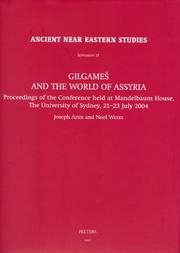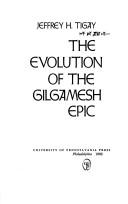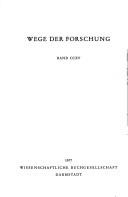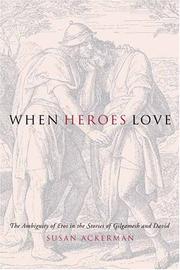| Listing 1 - 5 of 5 |
Sort by
|

ISBN: 9789042918023 9042918020 Year: 2007 Volume: 21 Publisher: Leuven, Belgium ; Paris ; Dudley, Mass : Peeters,
Abstract | Keywords | Export | Availability | Bookmark
 Loading...
Loading...Choose an application
- Reference Manager
- EndNote
- RefWorks (Direct export to RefWorks)
Gilgamesh --- Assyria --- Assyrie --- Congresses. --- Congrès --- 222.2 --- 299.219 --- Genesis --- Godsdiensten van Babyloniërs en Assyriërs --- Conferences - Meetings --- 299.219 Godsdiensten van Babyloniërs en Assyriërs --- Congrès --- Epic of Gilgamesh --- Ghilgameš --- Gilgamesch --- Gilgamesz --- Gilgāmish --- Guilgamesh --- Ishtar and Izdubar --- Ishtar (Assyro-Babylonian epic) --- Izdubar --- Jiljāmish --- Kilkāmish --- Sha naqba imura --- Assur (Kingdom) --- Asshur (Kingdom) --- Congresses
Book
ISBN: 9789004178489 9004178481 9786612950674 9047440838 1282950673 9789047440833 9781282950672 6612950676 Year: 2010 Volume: 39 Publisher: Leiden ; Boston : Brill,
Abstract | Keywords | Export | Availability | Bookmark
 Loading...
Loading...Choose an application
- Reference Manager
- EndNote
- RefWorks (Direct export to RefWorks)
The Akkadian Gilgamesh Epic, perhaps the most famous of Mesopotamian literature, has been considered the artistry of one author inspired by Sumerian tales. Specialists have assumed that all the earliest evidence (ca. 1800-1700 BCE) reflects this creative unity. Deep contrasts in characterization and narrative logic, however, distinguish the central adventure to defeat the monster Huwawa from what precedes and follows it. The Huwawa narrative stands on its own, so that the epic must have been composed from this prior Akkadian composition. Recognition of the tale embedded in the epic allows each block of material to be understood on its own terms. Such literary-historical investigation from contemporary texts is new to Assyriology and may produce important results when applied to other Mesopotamian writing. 'The book is well written and tightly argued...This makes it a first point of reference for anyone interested in the OB evidence for the Gilgamesh Epic.' Scott C. Jones, Covenant College
Assyriology --- Epic poetry, Assyro-Babylonian --- History. --- History and criticism. --- Gilgamesh. --- History and criticism --- History --- Gilgamesh --- Assyro-Babylonian epic poetry --- Assyro-Babylonian poetry --- Assyro-Babylonian studies --- Epic of Gilgamesh --- Ghilgameš --- Gilgamesch --- Gilgamesz --- Gilgāmish --- Guilgamesh --- Ishtar and Izdubar --- Ishtar (Assyro-Babylonian epic) --- Izdubar --- Jiljāmish --- Kilkāmish --- Sha naqba imura

ISBN: 0812278054 9780812278057 Year: 1982 Publisher: London ; New York, NY ; Rheine : University of Pennsylvania. University Museum,
Abstract | Keywords | Export | Availability | Bookmark
 Loading...
Loading...Choose an application
- Reference Manager
- EndNote
- RefWorks (Direct export to RefWorks)
Epic poetry, Assyro-Babylonian --- History and criticism --- Gilgamesh --- -Assyro-Babylonian epic poetry --- Assyro-Babylonian poetry --- History and criticism. --- Gilgamesh. --- -History and criticism --- Assyro-Babylonian epic poetry --- Epic of Gilgamesh --- Ghilgameš --- Gilgamesch --- Gilgamesz --- Gilgāmish --- Guilgamesh --- Ishtar and Izdubar --- Ishtar (Assyro-Babylonian epic) --- Izdubar --- Jiljāmish --- Kilkāmish --- Sha naqba imura --- Epic poetry, Assyro-Babylonian - History and criticism

ISBN: 3534044576 9783534044573 Year: 1977 Volume: 215 Publisher: Darmstadt Wissenschaftliche Buchgesellschaft
Abstract | Keywords | Export | Availability | Bookmark
 Loading...
Loading...Choose an application
- Reference Manager
- EndNote
- RefWorks (Direct export to RefWorks)
Gilgamesh --- Epic poetry, Assyro-Babylonian --- History and criticism --- 892.1 --- -Assyro-Babylonian epic poetry --- Assyro-Babylonian poetry --- Akkadische, Sumerische literatuur --- History and criticism. --- Gilgamesh. --- -Akkadische, Sumerische literatuur --- -892.1 Akkadische, Sumerische literatuur --- Assyro-Babylonian epic poetry --- 892.1 Akkadische, Sumerische literatuur --- Epic of Gilgamesh --- Ghilgameš --- Gilgamesch --- Gilgamesz --- Gilgāmish --- Guilgamesh --- Ishtar and Izdubar --- Ishtar (Assyro-Babylonian epic) --- Izdubar --- Jiljāmish --- Kilkāmish --- Sha naqba imura --- Epic poetry, Assyro-Babylonian - History and criticism

ISBN: 0231132603 9780231132602 0231507259 Year: 2005 Volume: *2 Publisher: New York : Columbia University Press,
Abstract | Keywords | Export | Availability | Bookmark
 Loading...
Loading...Choose an application
- Reference Manager
- EndNote
- RefWorks (Direct export to RefWorks)
Toward the end of the Mesopotamian Epic of Gilgamesh King Gilgamesh laments the untimely death of his comrade Enkidu, "my friend whom I loved dearly." Similarly in the Bible, David mourns his companion, Jonathan, whose "love to me was wonderful, greater than the love of women." These passages, along with other ambiguous erotic and sexual language found in the Gilgamesh epic and the biblical David story, have become the object of numerous and competing scholarly inquiries into the sexual nature of the heroes' relationships. Susan Ackerman's innovative work carefully examines the stories' sexual and homoerotic language and suggests that its ambiguity provides new ways of understanding ideas of gender and sexuality in the ancient Near East and its literature. In exploring the stories of Gilgamesh and Enkidu and David and Jonathan, Ackerman cautions against applying modern conceptions of homosexuality to these relationships. Drawing on historical and literary criticism, Ackerman's close readings analyze the stories of David and Gilgamesh in light of contemporary definitions of sexual relationships and gender roles. She argues that these male relationships cannot be taken as same-sex partnerships in the modern sense, but reflect the ancient understanding of gender roles, whether in same- or opposite-sex relationships, as defined as either active (male) or passive (female). Her interpretation also considers the heroes' erotic and sexual interactions with members of the opposite sex. Ackerman shows that the texts' language and erotic imagery suggest more than just an intense male bonding. She argues that, though ambiguous, the erotic imagery and language have a critical function in the texts and serve the political, religious, and aesthetic aims of the narrators. More precisely, the erotic language in the story of David seeks to feminize Jonathan and thus invalidate his claim to Israel's throne in favor of David. In the case of Gilgamesh and Enkidu, whose egalitarian relationship is paradoxically described using the hierarchically dependent language of sexual relationships, the ambiguous erotic language reinforces their status as liminal figures and heroes in the epic tradition.
Homoseksualiteit in de Bijbel --- Homoseksualiteit in de literatuur --- Homosexuality in literature --- Homosexuality in the Bible --- Homosexualité dans la Bible --- Homosexualité dans la littérature --- Homosexuality in literature. --- Homosexuality in the Bible. --- 222.6 --- Samuelboeken. Boeken der koningen. David. Salomon. Elia. Elisa. Josias --- David, --- Jonathan --- Jonathan, --- Jonathas --- יהונתן --- Daud, --- Dāwūd, --- Nabī Dāwūd, --- דוד --- דוד, --- דוד המלך --- Gilgamesh. --- Bible. --- Samuel (Book of the Old Testament) --- Shemuʼel (Book of the Old Testament) --- Epic of Gilgamesh --- Ghilgameš --- Gilgamesch --- Gilgamesz --- Gilgāmish --- Guilgamesh --- Ishtar and Izdubar --- Ishtar (Assyro-Babylonian epic) --- Izdubar --- Jiljāmish --- Kilkāmish --- Sha naqba imura --- Criticism, interpretation, etc. --- David (Biblical figure) --- David --- Jonathan (Biblical character) --- Gilgamesh --- Bible. Samuel --- Criticism, interpretation, etc
| Listing 1 - 5 of 5 |
Sort by
|

 Search
Search Feedback
Feedback About
About Help
Help News
News